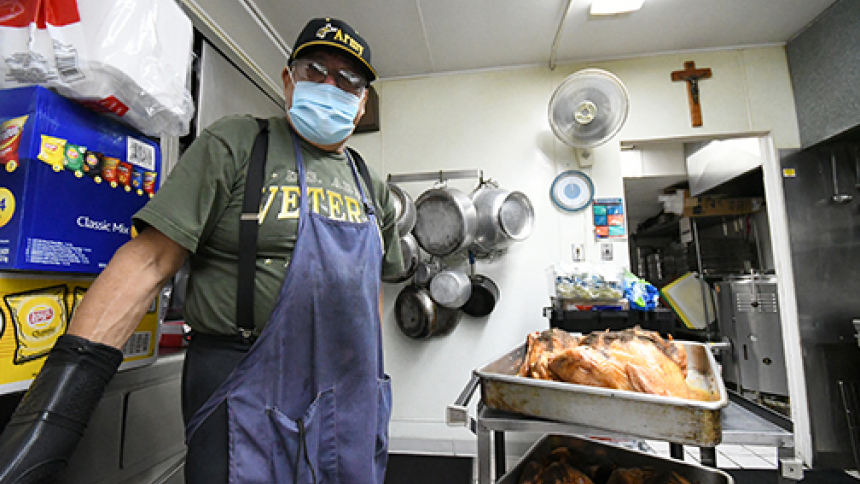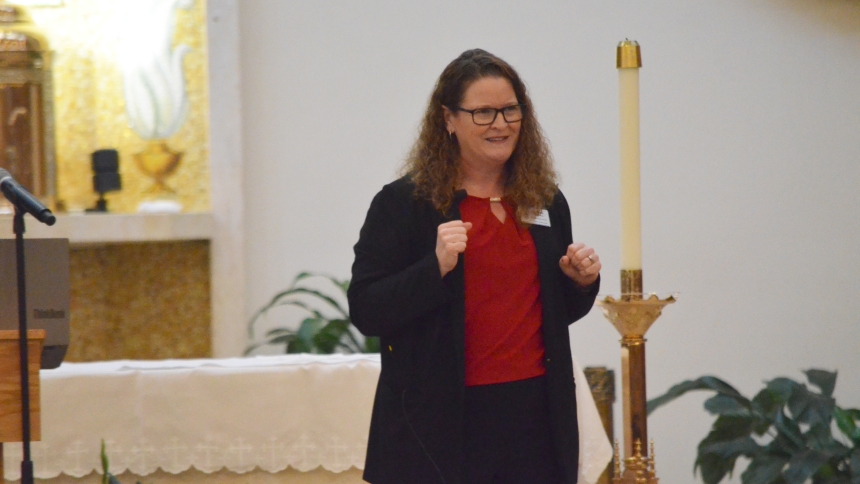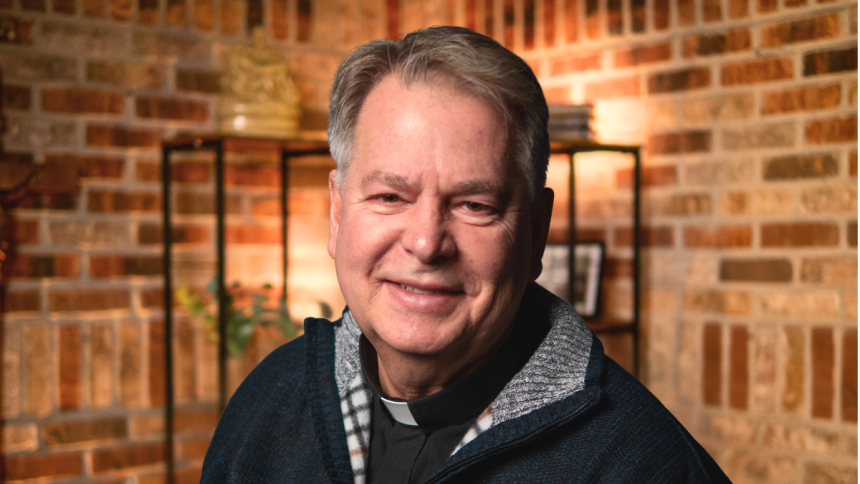
Ray Moreno, coordinator of the St. Joseph Soup Kitchen, moves a cooked turkey for meal preparation in the kitchen at the Manna for Hammond ministry on March 17. The longtime downtown Hammond charity was one of several ministries throughout the diocese that received expedited monies from the Mercy Fund during the early months of the coronavirus pandemic to support their operations, which have been modified to exclude indoor dining and instead provide sack lunches for the less fortunate who queue up outside the church on weekdays at noon. (Anthony D. Alonzo photo)
MERRILLVILLE | When a growing need arose from issues related to the coronavirus pandemic and resulting lockdowns, the Mercy Fund helped make delivering direct assistance to people a bit easier for some organizations and parishes.
The Mercy Fund, established in 2017 within the Catholic Foundation for Northwest Indiana, modified its application and delivery of financial assistance in 2020 and is retooling to restart its standard application season.
Grant seekers – generally defined as local Catholic groups engaged in completing corporal and spiritual works of mercy – can submit applications from April 15 to June 1. Up to $5,000 in benefits can be awarded for a project.
Catholic Foundation coordinator Judy Holicky said the vision of former Bishop of Gary Donald J. Hying carries on with a resource for charitable ventures to secure seed money, and get their good works off the ground.
“In 2016, it was Bishop Hying’s desire to create an endowment that would be a granting endowment,” Holicky explained. “The goal of it is to basically make the funds available for start-up ministries and allow them to complete their (initial) processes such as printing up flyers or training their volunteers.”
Since the establishment of the Mercy Fund in 2017 and the roll out of grants starting in 2018, local charitable endeavors have gotten early backing and have been inclined to grow from that point.
“We gave start-up funds to the St. Michael wheelchair ramp ministry of Schererville,” said Holicky, “I just got an email from (diocesan chief of staff) Mike Wick that they installed their 19th ramp (for residential access) – their first one was started through the Mercy Fund.”
Applications are considered by a grant committee that is made up of foundation board members and volunteers.
As the Mercy Fund is focused on a broad array of diocesan charitable efforts, and the foundation’s endowments are earmarked for specific individuals or causes, Wick said, “The Mercy Fund was set up as a continual reminder of Pope Francis’ call to the Year of Mercy.
“It’s looking for ways to put that mercy into action through the spiritual and corporal works of mercy,” Wick added.
In 2020, the distribution of some grants bypassed the traditional application process. Several ministries, from the local Society of St. Vincent de Paul Special Works Fund, to the Sacred Heart Food Pantry in LaPorte, received infusions of cash, boosting the confidence of the charities to assist people in the midst of a pandemic.
Diane McKern, second vice president and program director for the SVDP district council of Gary, believes the quick turnaround of funding in 2020 helped the council expedite cash to individual conferences most in need. She said she is grateful for the $1,500 awarded for food assistance as people became affected by the pandemic.
“We were able to help conferences who didn’t have a lot of money to purchase food for their pantries,” said McKern, of Hammond. “My parish, Our Lady of Perpetual Help, benefitted from that, thank God.”
SVDP also qualified for the $20,000 Good Shepherd Grant from the Catholic Foundation, a fountain of resources that continues to flow to those facing economic distress.
“I feel totally blessed to have been able to purchase food, and with the Good Shepherd Grant we continue to be able to pay whole bills of people’s NIPSCO utilities (as well as rent),” McKern said.
Holicky likes to ensure the faithful and other philanthropists who contribute to the Catholic Foundation that their beneficence is well protected. The organization and its team of financial advisors manages more than 40 active endowment funds, from seminarian to Catholic school-based endowments, valued at more than $11 million.
She said some of the region’s most respected investment bankers and attorneys monitor the health of the foundation’s assets.
“The endowment part of the fund will never be spent; we take only the earnings and interest in growth that is available twice a year,” Holicky explained.
Individuals or groups looking to establish an endowment for their special cause or memorial can inquire to the foundation, but are advised to check with their pastor if it is a school- or parish-based initiative.
Continuing to navigate the issues surrounding the pandemic and its fallout, thankful sentiments arrive at the foundation from those who help coordinate front-line charity across the four counties of the diocese.
Deacon Frank Zolvinski advises who he calls a great and resourceful team of volunteers associated with the LaPorte parishes. During the middle of last year, the number of people available to assist at the Sacred Heart Food Pantry in the city dwindled from 15-20 to four people due to coronavirus concerns.
But with adversity came innovation. Deacon Zolvinski said the nimble food pantry crew built a drive-up system for food distribution in the Sacred Heart parking lot.
The infusion of cash from the Mercy Fund last year was just what was needed for the parish’s “bargain finder” shoppers to replenish the 20-year ministry’s pantry.
“The pantry opened way before I got here as a deacon,” Deacon Zolvinski said. “In the past few years, we were very fortunate to get distribution monies from other grants as well that really helped us with our purchasing of groceries and household items.
He continued, “Before we were relying on parish donations. We were able to get enough food and supplies to serve our patrons, but when the grant came through, it gave us that extra cushion that we could feel safe about going out and purchasing more items for the people who need the food.”
Eligibility requirements for grants are available at www.catholicfuture.org/grant-seekers.
For more information about the Mercy Fund, the Catholic Foundation for Northwest Indiana or the grant-seeking process, call Judy Holicky at 219-769-9292, ext. 268, or email her at info@catholicfuture.org.


